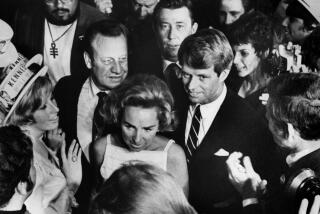Caroline Kennedy drops out as contender for Senate
- Share via
NEW YORK AND SAN FRANCISCO — Caroline Kennedy, a daughter of America’s most fabled Democratic dynasty, abruptly dropped her bid for a U.S. Senate seat early today, standing aside even though she was widely considered the front-runner to replace Hillary Rodham Clinton.
Her move came despite speculation -- and some published reports -- that New York Gov. David A. Paterson was about to give her the job. Kennedy, 51, has never run for office but enjoyed the support of powerful allies in New York and Washington. Her uncle, Sen. Edward M. Kennedy of Massachusetts, was among her chief patrons.
Caroline Kennedy released a one-sentence statement hours after the New York Post broke the story: “I informed Gov. Paterson today that for personal reasons I am withdrawing my name from consideration for the United States Senate.”
Her statement followed several hours of rumor-filled intrigue in which news organizations alternately reported that she was -- or was not -- abandoning her candidacy.
The reports changed hour by hour, from source to source, unfolding at virtually the same time that Clinton resigned her seat after being sworn in as secretary of State. The contradictions made an already prolonged selection process seem all the more chaotic.
Even without Kennedy in the running, there remains no shortage of candidates interested in replacing Clinton. The best known is state Atty. Gen. Andrew Cuomo, who was once married to Kerry Kennedy, Caroline Kennedy’s cousin. Paterson, who has sole responsibility for filling the vacancy, was expected to announce his choice in the next few days.
Kennedy surprised many by expressing an interest in becoming a New York senator, a job once held by her uncle, Robert. She generally steered clear of electoral politics after living in the White House as a girl, then growing up in seclusion after the 1963 assassination of her father, President Kennedy. She was inspired to assume a more public role, she said, by the candidacy of Barack Obama, who drew timely endorsements from Kennedy and her uncle during the Democratic primaries.
After contacting Paterson and asking to be considered, Kennedy emerged as the front-runner for the appointment -- at least in the eyes of the media. She hired a team of experienced political professionals to promote her candidacy with a campaign-style blitz. Among key backers were aides to New York Mayor Michael R. Bloomberg and some of New York’s powerful labor leaders. Senate Majority Leader Harry Reid of Nevada also spoke favorably of Kennedy’s bid.
But a tour of upstate New York and a series of media interviews in December did little to enhance her prospects. Kennedy was vague in some of her answers, peevish toward reporters and was widely mocked for her repeated use of “um” and “you know.”
A recent poll by Quinnipiac University showed slipping support for Kennedy, with a plurality favoring Cuomo, son of the state’s former governor, Mario Cuomo, to fill the seat. Only 37% of those surveyed said they thought Kennedy would make a good senator.
“A lot of political insiders in New York thought maybe she could get appointed, but within two years she couldn’t get elected,” said Bill Lynch, a longtime Democratic operative who has been advising Rep. Carolyn B. Maloney in her bid succeed Clinton.
Under state law, Paterson’s appointee must stand for reelection in 2010, when the governor is also due to seek election for the first time. Paterson assumed the job last year after Eliot Spitzer stepped down amid a sex scandal.
Despite speculation he had settled on Kennedy, Paterson consistently denied he was leaning any particular direction. Speaking to reporters Monday, he said he had narrowed his selection to a handful of finalists, but declined to offer a number or any names.
Paterson made the case for appointing a woman to replace Clinton, but said that would not be the sole criteria. Lately, the governor said, he had given greater weight to concerns about the economy and how New York’s next senator would address the issue.
People who know Paterson say he may have been irked by the aggressive politicking by Kennedy and her backers and the presumption in some quarters that she was a shoo-in.
“This governor doesn’t want to be told what to do,” said Hank Sheinkopf, a Democratic strategist who has watched the Senate maneuvering from the sidelines. “What he should do, he does the opposite. Why? He’s tired of being treated like he’s an accidental governor. He’s doing what he wants to do, what he thinks is right for the state, for his party and, yes, for him.”
Other Senate prospects include U.S. Reps. Steve Israel and Kirsten Gillibrand, Nassau County Executive Tom Suozzi, Buffalo Mayor Byron Brown and Randi Weingarten, New York-based president of the 1.4-million member American Federation of Teachers.
--
Janet Hook in Washington contributed to this report.
More to Read
Get the L.A. Times Politics newsletter
Deeply reported insights into legislation, politics and policy from Sacramento, Washington and beyond. In your inbox three times per week.
You may occasionally receive promotional content from the Los Angeles Times.











